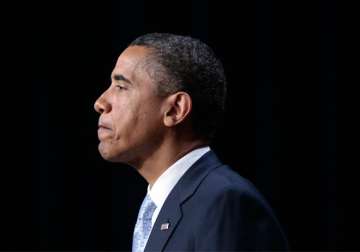Washington, Jun 17: US President Barack Obama's top general in Afghanistan has given him a range of options for withdrawing American forces as a July deadline for starting the drawdown approaches.
Obama spokesman Jay Carney said Gen. David Petraeus, along with other members of the national security team, met with the president at the White House on Wednesday.
Petraeus, the top U.S. and NATO commander in Afghanistan, has long been expected to give Obama multiple options for how to begin bringing U.S. forces home and at what pace.
“They discussed a range of options,” Carney said. “As I think the general has said in the past publicly, this was a question of options, plural, and not option.”
White House officials would not divulge details of the options Obama is considering. Carney said Obama will consult further with his national security team, including Petraeus, in the coming days, and announce his decision to the public soon.
The war is now in its 10th year. The U.S. has roughly 100,000 troops in Afghanistan, three times as many as when Obama took office. When the president sent an additional 30,000 U.S. forces at the end of 2009, he did so with the caveat that some of those troops would start coming home in July 2011.
Obama has said the initial withdrawal will be “significant,” but others in the administration, including outgoing Defense Secretary Robert Gates, have called for a more modest drawdown.
Administration officials say they are focused not only on how many troops will leave Afghanistan next month, but how the U.S. will meet its goal of giving Afghans control of their own security by the end of 2014. To that extent, Obama's decision may clarify the broader path to ending the U.S. combat mission in Afghanistan.
The president's aides are emphasizing that Obama's deliberations are more informal than the extensive process he went through in 2009 ahead of the so-called troop surge, when he consulted numerous times with top military and national security advisers.
“That process was designed to produce the policy and the strategy that the president forged and announced in December of 2009,” Carney said. “This discussion, these meetings, and the result, which will come with his announcement, are part of that implementation process.”
As the president deliberates, he faces increasing calls from congressional lawmakers for a substantial drawdown.
A bipartisan group of more than two dozen senators sent Obama a letter Wednesday saying it makes no sense to maintain a significant number of troops in Afghanistan.
They cited the recent death of al-Qaida leader Osama bin Laden and CIA Director Leon Panetta's assessment that fewer than 100 al-Qaida members remain in Afghanistan.
“Given our successes, it is the right moment to initiate a sizable and sustained reduction in forces, with the goal of steadily redeploying all regular combat troops,” the senators wrote. “The costs of prolonging the war far outweigh the benefits. It is time for the United States to shift course in Afghanistan.” AP
Latest World News
